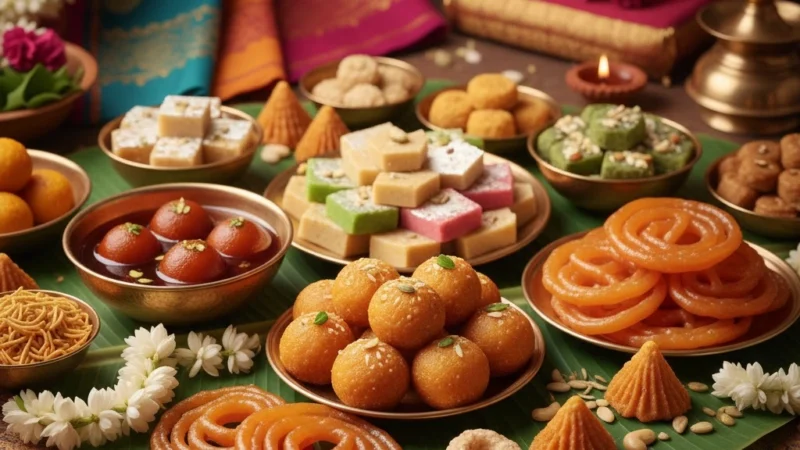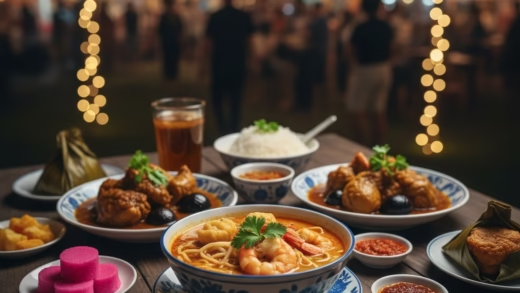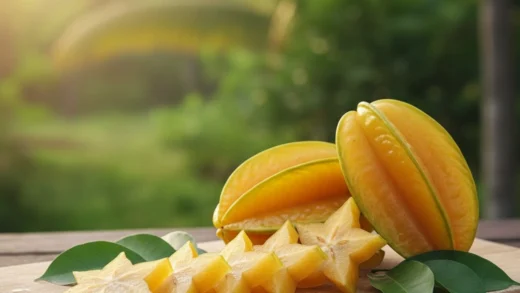Top 10 Deepavali Sweets to Try in Malaysia

Introduction
Deepavali, also known as the Festival of Lights, is one of the most significant Hindu festivals celebrated in Malaysia. Celebrated by the Malaysian Indian community, it marks the triumph of light over darkness and good over evil. Deepavali traditions in Malaysia are deeply rooted in cultural practices, family gatherings, temple visits, and the preparation of traditional foods and sweets. Over the years, Malaysian Deepavali celebrations have evolved to blend Indian customs with local culture, creating a vibrant and inclusive festival.
Origins and Evolution of Deepavali in Malaysia
Deepavali was brought to Malaysia by Indian immigrants, particularly during the British colonial era. Over time, these customs became an integral part of Malaysian culture, and the festival is now celebrated widely across the country. Malaysian Deepavali history and culture reflect a blend of Indian heritage and local influences, with celebrations including temple prayers, home decorations, and festive feasts.
Today, Deepavali is a public holiday in many Malaysian states, emphasizing family, reflection, and joy. Communities focus on lighting diyas, making rangoli patterns, and organizing open houses to welcome relatives and friends.
Significance of Deepavali for the Indian Community in Malaysia
For Malaysian Indians, Deepavali is not just a festival—it is a celebration of identity, heritage, and family. Malaysian Indian festival celebrations emphasize values such as unity, prosperity, and renewal. It is a time to reconnect with family, visit Indian temples like Batu Caves in Selangor or Sri Mahamariamman Temple in Kuala Lumpur, and honor ancestral traditions.
Traditional Customs and Rituals
Oil Bath and Temple Visits
Deepavali morning often begins with an oil bath, symbolizing purification. Devotees then visit temples to offer prayers and seek blessings. Popular temples like Sri Mahamariamman Temple and Batu Caves host elaborate rituals attracting thousands of devotees.
Home Decorations
Homes are decorated with diyas, colorful candles, and rangoli (kolam) at entrances, symbolizing the welcoming of light, positivity, and prosperity.
Family Gatherings and Open Houses
Families celebrate together, exchanging gifts, sharing festive meals, and hosting open houses for friends and community members. This hospitality is a key feature of Malaysian Indian festival celebrations.
Regional Celebrations Across Malaysia
Kuala Lumpur
The Sri Mahamariamman Temple, established in 1873, is a central hub for Deepavali in the city. Devotees gather here for rituals, prayers, and cultural performances.
Penang
George Town’s Little India becomes a vibrant street festival with decorations, traditional sweets, and cultural shows. Penang offers an immersive experience of Malaysian Indian festival celebrations.
Johor
Johor hosts grand Deepavali celebrations with temple rituals, cultural performances, and community feasts. Its celebrations are often influenced by neighboring Singapore.
Ipoh
In Ipoh, Deepavali is celebrated with traditional music, dance performances, and a variety of Indian delicacies, reflecting the city’s rich cultural heritage.
Top 10 Deepavali Sweets to Try in Malaysia
Deepavali is synonymous with a variety of traditional sweets that delight families and guests. Here are the top 10 sweets to try in Malaysia during Deepavali:
- Murukku – A crunchy, spiral-shaped snack made from rice and urad dal flour, often spiced with cumin and sesame seeds.
- Gulab Jamun – Soft, deep-fried dough balls soaked in sugar syrup, flavored with cardamom or rose water.
- Jalebi – Bright, crispy spirals soaked in syrup, offering a sweet and tangy taste.
- Ladoo – Round sweets made from flour, sugar, and cardamom, often garnished with nuts.
- Coconut Burfi – Fudge-like sweet made with grated coconut, sugar, and milk, flavored with cardamom.
- Adhirasam – A South Indian specialty, deep-fried rice flour and jaggery doughnut.
- Kaju Katli – Diamond-shaped cashew sweets with smooth texture, commonly gifted during festivals.
- Rava Kesari – Semolina-based dessert cooked with ghee, sugar, and saffron for a rich flavor.
- Peda – Milk-based sweet flavored with cardamom, often garnished with pistachios.
- Kozhukattai – Steamed rice dumplings filled with jaggery and coconut, a traditional festival offering.
Where to Celebrate Deepavali in Malaysia
- Kuala Lumpur: Visit Sri Mahamariamman Temple for rituals, prayers, and cultural events.
- Penang: Explore Little India in George Town for street festivities, lights, and sweets.
- Johor: Experience temple rituals and community feasts with a touch of international influence.
- Ipoh: Enjoy traditional music, dance, and authentic Indian delicacies during the festival.
Conclusion
Deepavali in Malaysia is a colorful, joyous celebration that combines Indian traditions with Malaysian cultural influences. From family gatherings and temple visits to mouth-watering sweets and elaborate home decorations, Malaysian Deepavali traditions offer a rich cultural experience. Whether you are in Kuala Lumpur, Penang, Johor, or Ipoh, experiencing Deepavali in Malaysia is a chance to embrace the country’s vibrant Indian heritage.







Comments are closed.